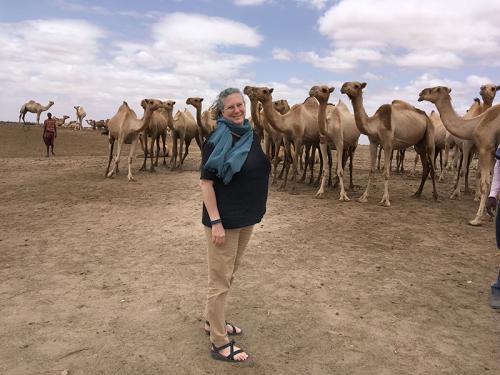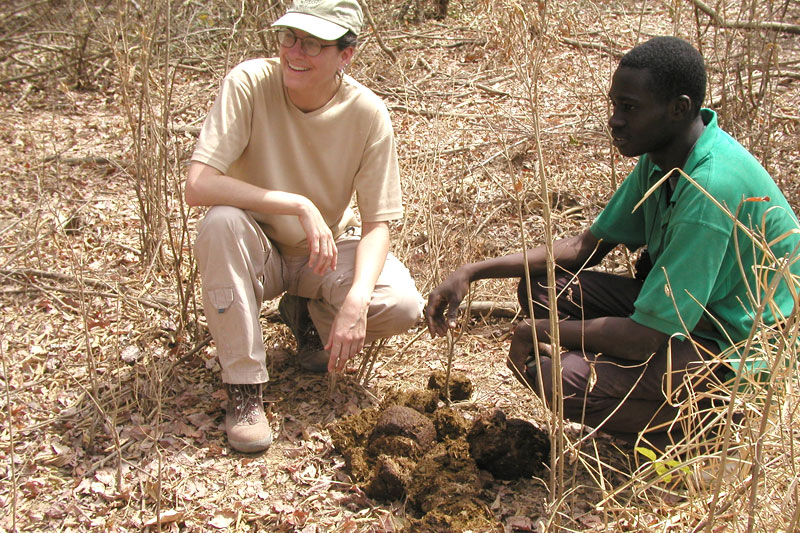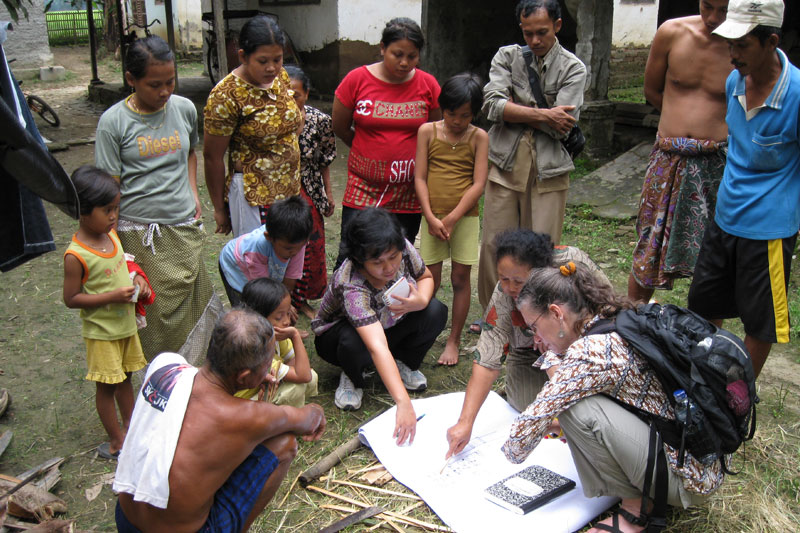Christine Jost

Veterinarian, humanitarian, social scientist, and former Peace Corps Volunteer, Christine Jost, DVM, MA knew early on that she wanted to craft a career working as a veterinarian internationally. After graduation from veterinary school, Christine worked for a few years in mixed animal practice, before returning to Tufts University where she gained valuable experience working on the Highly Pathogenic Avian Influenza outbreak in Southeast Asia. Since then she has held positions at the International Livestock Research Institute, the World Agroforestry Center, and now works with the USAID Bureau of Humanitarian Assistance as a Senior Livestock Technical Officer. We appreciated her insights and practical, direct advice for veterinary students and early career veterinarians considering an international career.
Veterinary School & Year Graduated: Tufts University, 1996
Additional Degree: MA, International Relations, Tufts University, 2003
- Tell me about your most challenging and rewarding veterinary jobs or work experiences.
- While I was still at Tufts Highly Pathogenic Avian Influenza (HPAI) became a problem in Southeast Asia. In 2005 FAO contracted Tufts to provide technical advisory services and lead a program in Indonesia for the surveillance and control of HPAI. I worked on that program for two years and was seconded to the United Nations Food and Agricultural Organization (FAO) in Indonesia where I started as the chief training advisor and then transitioned to the chief technical advisor. It was a very rewarding and challenging experience. Rewarding because I learned so much not only about surveillance and disease control, but also about veterinary services, systems, communities, and livelihoods and what diseases like HPAI meant for the communities that we were working with, which is basically almost all of Indonesia. It was also an opportunity for the greatest growth in my career and was challenging because HPAI is a complex social, cultural, and economic issue. The project required a lot of on the job diplomacy and working with multiple levels of government, international organizations, and other stakeholders that were influencing disease response. It was a "pressure cooker" experience but also I got to work with a lot of amazing and wonderful people.
- What did you love about the position or experience?
- I really loved working with the Ministry of Agriculture and the veterinary services of Indonesia. There was a core of really hard-working, deeply thoughtful, dedicated veterinary professionals that were working on a situation in the middle of the world stage. A big part of the motivation in international veterinary work is the people that we meet and work with and the cross-cultural growth that we experience as individuals. I also love One Health as a concept. The H5N1 episode in Southeast Asia brought attention to concepts of the intersectionality between ecosystems, animal health, and human health and it was a major test case for One Health. It was exciting and rewarding for me to be on the ground working on HPAI in Southeast Asia as a real One Health issue.
- Tell me about your journey to get to that point in your life.
- After college, I knew that I wanted to be a veterinarian and that I wanted to work internationally for the rest of my life. I also joined the Peace Corps after college and was in Malawi for three years. I was trying to figure out how to do both of those things, be a vet and work internationally. I chose Tufts for vet school because I got in, they have a really robust international medicine program, and offer a dual degree DVM/MA program between the Fletcher School of International Law and Diplomacy and Tufts Veterinary School. As a veterinary student, I spent over a year working internationally doing research and consulting. I also knew that I needed clinical experience so that's why I chose to go into practice. I worked in mixed animal practice while finishing up at the Fletcher School. I didn't have a clear idea of how I would transition from practice back into international veterinary medicine, but there was a faculty position that opened up at Tufts after I'd been in practice for three years. I applied for the position and went back to Tufts.
- As a veterinary student, did you ever imagine yourself taking this journey and having these professional experiences?
- Yes, by the time I got into that in vet school, it was very clear to me. I was in a five-year program because I also completed the master's degree at the Fletcher School which was specifically because I wanted to work in international medicine. My strong focus on participatory epidemiology and One Health was because of my experiences in veterinary school and finding the things in veterinary medicine that interested me.
- In retrospect, what do you wish you’d known as a veterinary student or early in your career?
- Early on in my career, I was the only female in my international veterinary medicine network. I wish I’d had more cognizance, skills, and power as an individual and greater belief in myself as a woman and how to deal with gender dynamics to promote my own advancement and ensure my place as a woman in international veterinary medicine. Younger generations have much more awareness and skill, but I don't think the issue is gone. We're educating more women than men but I think young women in the career face many of the same dynamics. By the time they get to my point in their career, they'll probably be having the same thoughts about things that they wish they had known or wish they could do to advance themselves. It's certainly part of my thinking and reflection.
- Would you have changed anything about your time in veterinary school?
- No. In veterinary school, I did just about everything that I wanted to do and made really good choices.
- Would you have changed anything about your career path since graduating?
- After veterinary school I spent a year at the Fletcher School, and whilst I was there I also practiced part-time as a mixed animal clinician. I still wonder if I should have done the internship and residency track after finishing school. I also had Ph.D. opportunities. In the end, I chose not to pursue it because of finances. I needed to start working on the loan situation. As a professor, I encouraged students that were interested in international veterinary medicine to pursue a second degree, along with, or after their DVM. The field has also been changing. I think I was in the last generation that could do this kind of work without a Ph.D. or MPH.
- Did you have any mentors or role models along the way that helped or inspired you? Please provide an example of how they helped you or what qualities they had that made them a good mentor? How did you find them?
- As a veterinary student, I had professors that were excellent mentors, as both research advisors and career advisors. At that time, the conversations were more along the lines of how I was working internationally and the network I was building. I wasn’t mature enough as a person to have in-depth conversations about designing my career yet. I also had advisors that were great at helping me understand how international organizations work. My most influential mentors weren’t veterinarians, however. They were colleagues and mostly women who were really knowledgeable about how to get through the working world. They played that combined role of a professional mentor, personal advocate, and friend.
- Tell me about any pivotal moments or key turning points that shaped your career.
- There have been a couple. One was the decision to leave Tufts and go to the International Livestock Research Institute (ILRI). That was a hard decision for a few reasons. I was leaving the concept of job security in academia, and also personally it was hard. At the time I was in a relationship and getting married. My fiancé was offered a position at ILRI, and I was faced with the choice of following him to ILRI or potentially losing the relationship by staying with Tufts. In the end, I think I made the right choice as my learning and growth as a scientist at ILRI was outstanding, but at times I still wonder what my career would have looked like had I chosen the job security of academia rather than the diversity of experiences I gained by working with organizations such as ILRI and the World Agroforestry Center. I think this is a hard choice that women as international professionals face more often than men, and it weighs on my mind.
I wanted to go to ILRI because I was seeking deeper research opportunities and I knew I needed more robust mentorship as a scientist. I learned a heck of a lot from the scientists there. Not only in epidemiology, but also in diverse fields like sociology and economics. I got a lot of exposure to all the science that needs to come together to really understand the social and economic conditions of disease dynamics.
Another key turning point was when I joined the Climate Change, Agriculture, and Food Security Program of the CGIAR. That was the first position where my primary role was not as a veterinarian or epidemiologist. That’s when I really started focusing on issues like gender and the uptake of research outputs for climate change adaptation and mitigation. Again, that was a hard decision to make. I'm a veterinarian and I'd spent all this time working on epidemiology and disease surveillance and control, yet I was taking a job outside of that track. It was great and in the end, I was able to take my foundational knowledge and apply that outside of epidemiology. - Tell me about one or two challenges, setbacks, or obstacles that you faced along the way on your professional journey. How did you address those?
- One of the greatest challenges I’ve had was developing skills as a research scientist. My career was in research but I wasn't a Ph.D. To address that, I put myself in the right places and worked to be absorptive and learn from my colleagues. The other challenge I faced was the legitimacy of my position as a research scientist and perceptions of the validity of my position as an epidemiologist. I tackled that by being obstinate and sometimes swallowing biases and perceptions and working through them.
- What was the most important lesson you learned as a veterinarian, and still remember today, and would want to tell vet students about?
- No matter what kind of veterinarian you are, you are a veterinarian. No matter what else you do, what other degrees you hold, you’re a veterinarian first. There is a hard to articulate responsibility about holding the title of veterinarian that all of us need to uphold in terms of our responsibilities and professional capacities. I also want to emphasize the seriousness of the veterinarian-patient-owner relationship. It's a unique career path with a unique viewpoint and responsibilities.
- What’s been the biggest highlight of your career so far?
- I've done some really great things such as working on the eradication of rinderpest and the development of participatory epidemiology as a science, but I would answer that by acknowledging the very large and unique set of people that I've worked within an international career. I think there are very few people in the world that can understand this type of career and the rewards that it brings to be able to work across cultures with different people.
It was helpful for me to do work outside of my comfort zone because it helped me understand all of the different disciplinary dynamics and how important it is to talk and collaborate across disciplines.
Another highlight, and one of the things I am proudest of was developing a toolkit for participatory gender research in climate change for the Research Program on Climate Change, Agriculture and Food Security (CCAFS). All the tools that we developed came from participatory epidemiology but were applied in the gender and climate change context. - Is there anything else you’d like to tell me that you think would be helpful or relevant to veterinary students or early-career veterinarians?
- First of all, to early career veterinary students or even students in high school or university that are thinking of going into veterinary medicine: Congratulations, because it's a great career! Veterinary medicine is also a heartfelt career and there are sacrifices. Explore and get to know the whole career. There are just so many things that veterinarians do and so many places that veterinarians need to be. Take the opportunity to really get to know everything about veterinary medicine, even as you develop your more narrow interests. Keep an open mind and learn about all of these aspects. You never know what's going to happen. Even within the veterinary community, being able to have conversations with other veterinarians outside of your narrow specialty is important in terms of the advocacy role that the veterinary community plays.
As a faculty member, I was clear on three things with all the students that I mentored in Tufts’ International Veterinary Medicine Program. 1) Don't go straight into an international career, get experience working as a veterinarian first; 2) Have an interest and explore that interest, but do things outside of that interest to broaden your horizons; 3) Go through the full research cycle. Write your own proposal, get your own funding, do your own research internationally and publish that research so by the time you graduate, you've got that publication on your CV.


